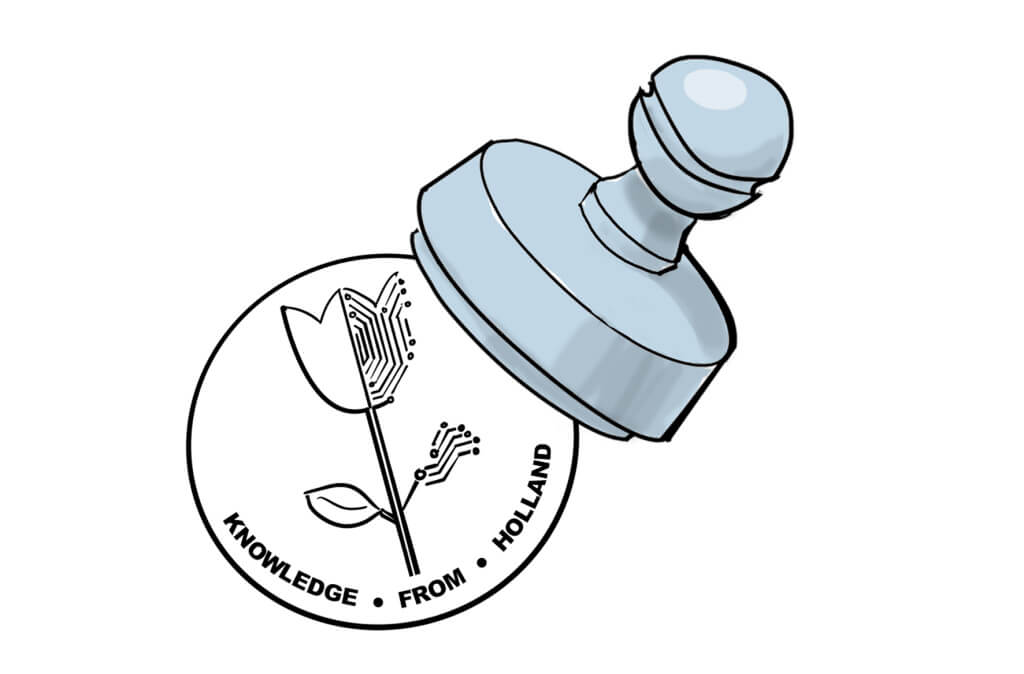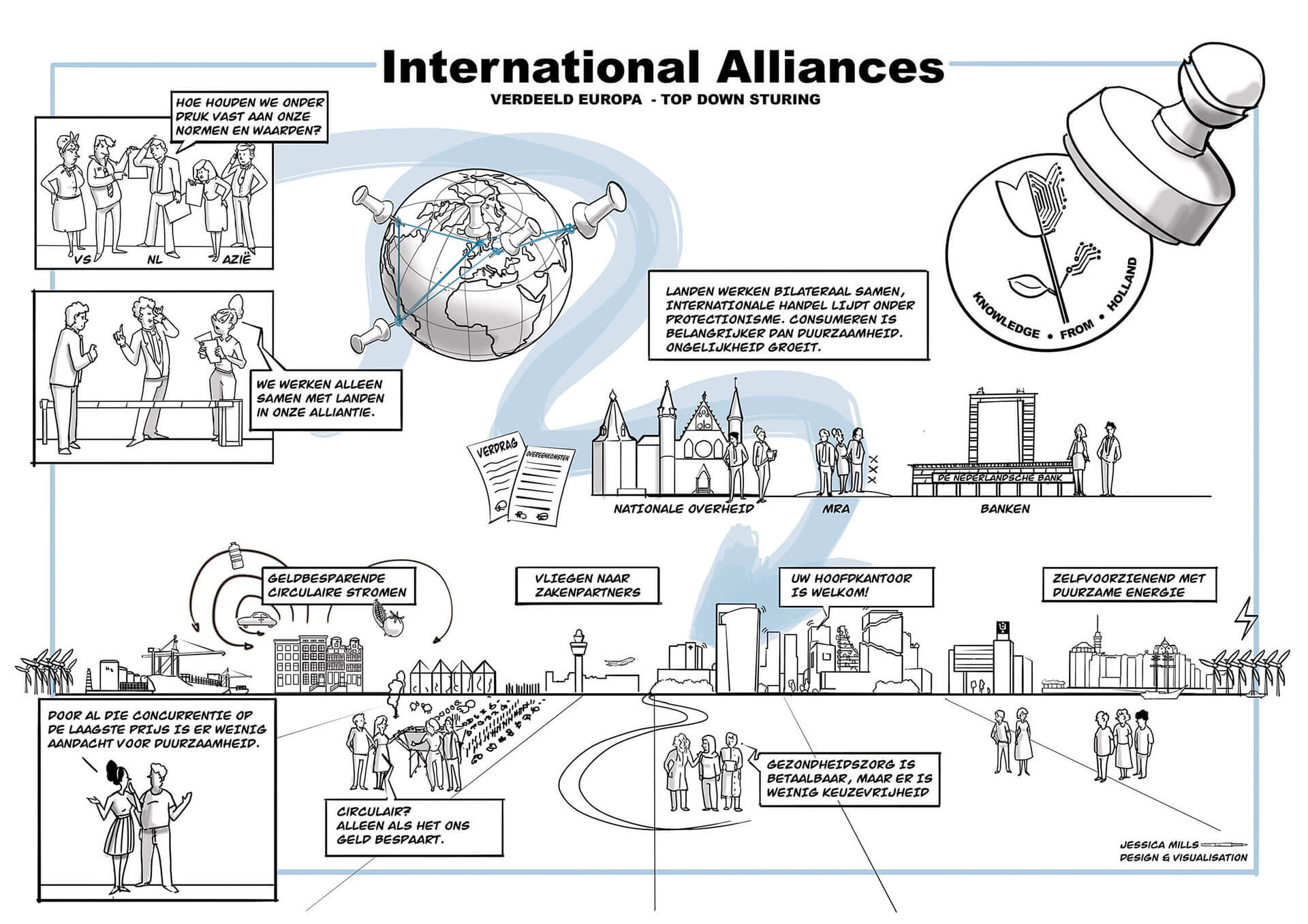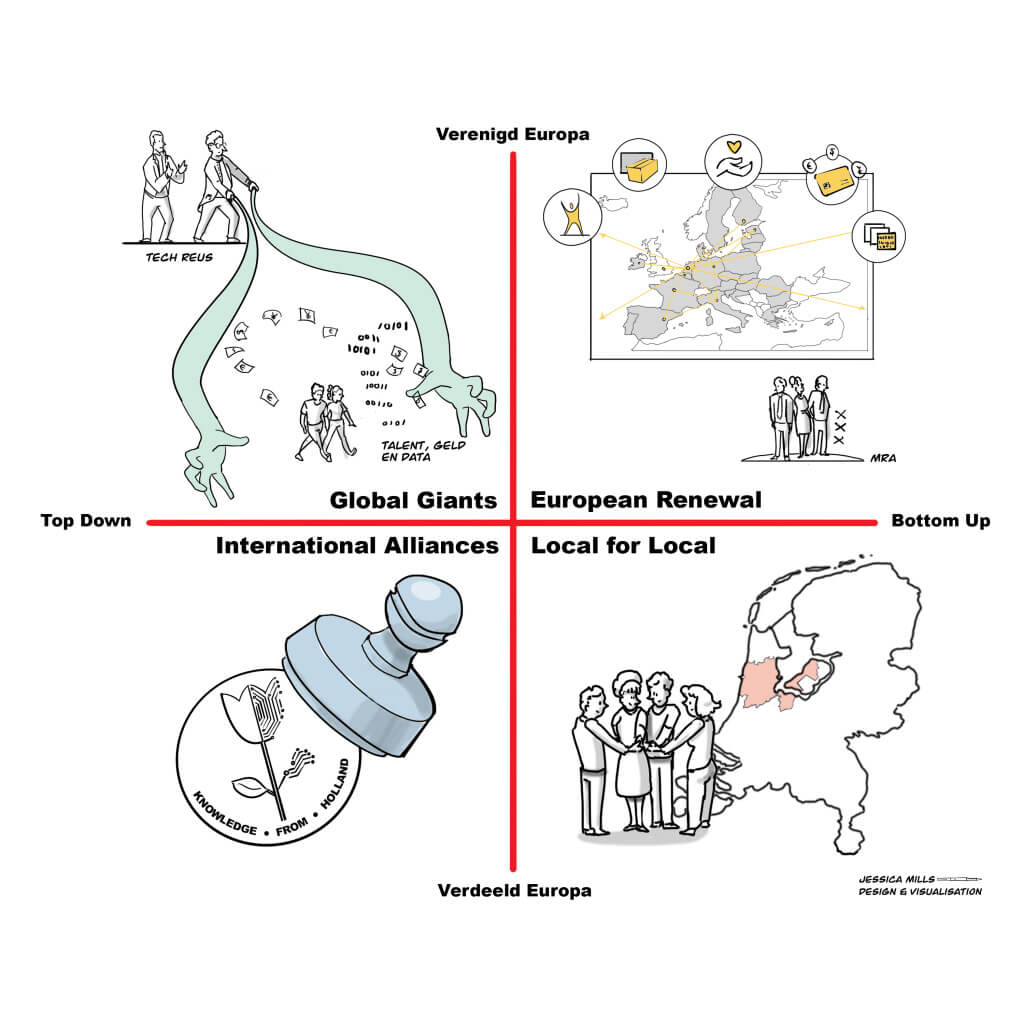Scenario: International Alliances
In het scenario International Alliances, valt Europa uiteen en de overheid en economie werken sterk top-down, wat leidt tot een wereld van protectionisme en nationalisme, met onenigheid tussen voormalige EU-lidstaten. In deze wereld zoeken stedelijke regio’s naar allianties met andere regio’s om competitieve voordelen te kunnen behalen. De laatste update van dit scenario was op 9 juni 2020.

Kernwoorden bij dit scenario:
- Competitie
- Investeringskracht
- Consumerende inwoners
- Nationalisme en Protectionisme
- Zoeken naar internationale allianties
Hieronder zie je onze praatplaat voor het scenario International Alliances. Elk scenario heeft zo’n plaat (onderaan dit artikel vind je de links naar de andere drie scenario’s), waarin de verschillen tussen de scenario’s en belangrijke elementen van elk scenario scherp gevisualiseerd zijn. Samen met de tekst hieronder krijg je zo snel een indruk van de wereld die bij elk scenario hoort.

Verdeeld Europa, top down sturing
Fiscale aantrekkingskracht om grote bedrijven te behouden
Het is 2040. Grote onenigheid tussen de lidstaten heeft de EU verdeeld. De handel binnen Europa is gekrompen na jarenlang gebakkelei, nationalisme en populisme. Nationale overheden hebben bevoegdheden teruggepakt en acteren vanuit economisch eigenbelang. Door middel van fiscale voordelen en deregulering proberen ze bedrijven te behouden en/of te lokken. Grote multinationals spelen overheden tegenover elkaar uit. Een verzwakt Brussel kan geen tegenwicht bieden en landen en regio’s verenigen. Het versnipperde Europa maakt het moeilijk om internationaal afspraken te maken en de uitvoering goed te coördineren. Europese migratiebewegingen komen op gang door grote verschillen in arm en rijk. Velen zoeken, soms tegen beter weten in, hun geluk en veiligheid elders, maar de eigen-bevolking-eerst-mentaliteit zit hen in de weg.
Europese fondsen worden vervangen door internationale allianties
Doordat Europa geen speler van belang meer is, richten bedrijven en kennisinstellingen zich op relaties binnen Nederland, haar buurlanden en op strategische allianties in het verre buitenland. Door versnelde digitalisering kan dit op een soepele manier. De Europese innovatiefondsen zijn weggevallen en de Europese Green Deal is nooit van de grond gekomen. Hierdoor moeten partijen op een andere manier hun Research & Development en verduurzaming financieren. De Nederlandse middelen zijn beperkt, allianties met kapitaalkrachtige bedrijven, filantropen en overheden uit Europa maar ook uit Azië en Amerika, zijn noodzakelijk. Zij bepalen de spelregels en het is moeilijk om Europese waarden en normen hierin gewaarborgd te krijgen. Voor deze internationale partijen is Nederland met haar hoogopgeleide bevolking en internationale handelsgeest nog steeds een aantrekkelijke handelspartner. Meer dan ooit verenigen de Nederlandse kennisregio’s zich, onder aanvoerderschap van het Ministerie van Economie in ‘Knowledge from Holland’ om samen sterk te staan.
Wat betekent dit voor de Metropool Amsterdam?
We werken aan een slimme, groene en gezonde metropool van de toekomst. In het scenario International Alliances is er een aantal krachten die daarbij helpen. Tegelijkertijd zijn er ook bedreigingen. Wat moeten en kunnen we doen om in dit scenario de juiste stappen te zetten?
Weinig initiatief uit een verdeelde samenleving
Door het uiteenvallen van Europa moet Nederland steeds meer zijn eigen boontjes doppen. De rijksoverheid heeft allerlei bevoegdheden naar zich toegetrokken om dit zo goed mogelijk te kunnen doen. In het hele land dringt het besef door dat het land zich moet verenigen om niet ten onder te gaan in het internationale gewoel. De traditionele instituties, van overheden, bedrijven en banken, zitten nog steeds op de bestuurdersstoel. Men klaagt over de overheid en over de macht van grote bedrijven, maar alternatieven zijn er vanuit de samenleving niet opgekomen.
Binnen de MRA spelen de relaties met Den Haag een belangrijke rol, waarin Amsterdam een steeds belangrijkere positie inneemt en veel bepaalt, net als de regio’s Eindhoven, Rotterdam en Den Haag. Onderling proberen ze elkaar de kaas van het brood te eten. De andere delen van het land doen mee, maar erkennen dat zij economisch sterk afhankelijk zijn, met name van de hoofdstad. De wethouders zitten wekelijks met de minister om tafel om slimme deals te sluiten met buitenlandse partijen, ondersteund door ondernemers en kenniswerkers die uitstekend gepositioneerd zijn op dit internationale speelveld. Een sterk nationaal net van (spoor)wegen zorgt voor fysieke verbinding. Binnen de MRA neemt Amsterdam de leiding. De minder krachtige deelregio’s hebben duidelijk minder in te brengen.
Internationaal gezien worden vooral contacten onderhouden met enkele welwillende andere regio’s en partijen, waaraan Nederland complementair is en waarmee zij bilateraal goede banden onderhoudt. Schiphol richt zich vooral op die regio’s waar deze zakelijke contacten zich bevinden. Europese treinverbindingen zijn niet tot stand gekomen. De toeristen die Nederland bezoeken, doen dat met het vliegtuig, de bus of de auto.
Kostenbewustzijn wint het van milieubewustzijn
Toegenomen economische onzekerheid doet een grotere groep inwoners van de MRA op de kleintjes letten. Consumenten willen het goedkoopste en makkelijkste product, ook al wordt het door een grote multinational in een lagelonenland via massaproductie gemaakt. Consumenten en kleine bedrijven zijn afhankelijker van deze multinationals, door gebrek aan Europese harmonisatie en standaardisatie. Hierdoor kan je niet zomaar naar een concurrent overstappen. Duurzaamheid en maatschappelijke verantwoordelijkheid worden gezien als ‘mooi meegenomen’, maar genieten geen prioriteit. In deze individualistische wereld zijn deelconcepten nauwelijks aangeslagen. Ook de gezondheidszorg is sterk afhankelijk van enkele grote data- en farmabedrijven. Zij bieden kostenefficiënte oplossingen aan, maar onder weinig flexibele voorwaarden. Privacy en open data zijn minder vanzelfsprekend.
Efficiency en substitutie voor meer energie- en grondstoffenzekerheid
Protectionisme en handelsoorlogen hebben de leveringszekerheid van grondstoffen en van fossiele energie verminderd. Nationale overheden voelen daarom de urgentie om daar minder afhankelijk van te zijn. Ook Nederland zet forse stappen en partijen beperken, al dan niet gedwongen, hun energiegebruik. De windmolens op zee – die weliswaar duur zijn door import van materialen – zijn belangrijk om ook voor de productie van energie onafhankelijk(er) te zijn. Omdat meer landen dezelfde beweging maken, blijven de offshorebedrijven spelers van wereldformaat. De Groningse gaskraan gaat in koude winters nog regelmatig open. Ook op gebied van grondstoffen wordt zoveel mogelijk gebruik gemaakt van producten van eigen bodem en wordt volop ingezet op circulaire economie. Immers, slim hergebruiken is in dit scenario veel goedkoper dan nieuw importeren. Op de juiste schaal kringlopen sluiten voor circulaire initiatieven blijkt vaak nog problematisch. De landbouwsector richt zich steeds meer op de behoeften van de eigen bevolking.
De handel via zeevaart wordt minder belangrijk voor de MRA en de ruimte in de havens wordt ingezet ten behoeve van circulaire fabrieken. De elektriciteit vanaf zee komt onder andere in de MRA aan land, waardoor ook de energie-intensieve industrie hier een plek zoekt. Deze industrie moet hiervoor wel de omslag maken van gas naar elektriciteit, waterstof of biogas.
Bedrijven (en overheden) proberen zelf het wiel uit te vinden en voor zichzelf te houden. De uitdaging in dit scenario ligt dan ook vooral in het doorbreken van de lage bereidheid tot samenwerking en kennisdeling en in het faciliteren van de juiste (voorwaarden voor) allianties. Daarnaast is er een uitdaging om de randvoorwaarden te scheppen om de focus te verleggen van efficiëntie naar daadwerkelijke, duurzame innovatie. Om investeringen lokaal te laten landen is een regionaal fonds opgericht waarin ook rijke individuen en een beperkt aantal bedrijven hun geld steken.

Het scenario International Alliances maakt deel uit van de MRA scenario’s.
Via deze link kom je bij het volledige artikel over de toekomstscenario’s. Of klik direct hieronder om ook de andere scenario’s te lezen.
20 mei 2019
Meer weten over
Neem contact op
Blijf jij ook op de hoogte?
8x per jaar nieuws en events uit de regio: schrijf je in voor de Board Update nieuwsbrief
Deel dit artikel
Wil je op de hoogte blijven?
Volg ons dagelijks op LinkedIn en schrijf je in voor de Board Update nieuwsbrief.
Lees ook deze berichten
- Een nieuwe lichting gedreven jongeren is aangetreden bij Young on Board, de ...
- Met de selectie van vier kanshebbers is de regionale voorronde van de ...
- Met meer dan 80 ondernemers, 40 investeerders en diverse dienstverleners bood LSH Capital Match ...
